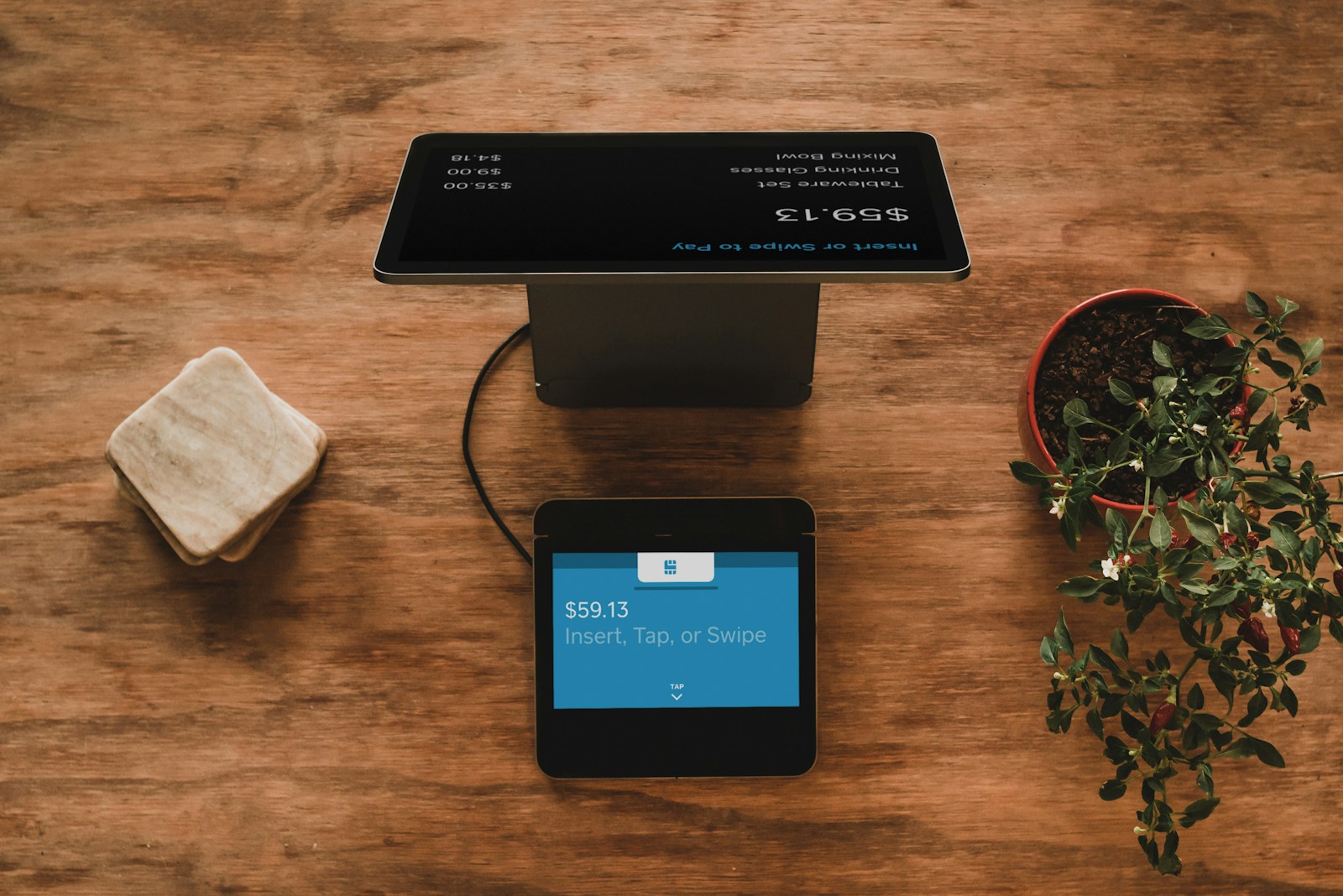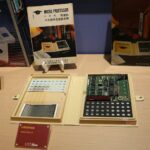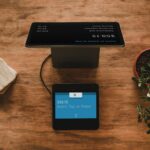Point-of-sale (POS) software has evolved far beyond traditional cash registers. In 2025, modern POS systems serve as the digital nerve center of small businesses, streamlining transactions, tracking inventory, managing customers, and syncing data across locations—all from the cloud or your countertop.
With dozens of vendors flooding the market, choosing the right POS solution can feel overwhelming. That’s why we evaluated the top systems currently available on Amazon and tested them across a variety of business types—from retail to food service. Our list below highlights software-only solutions as well as complete POS hardware bundles, so whether you’re just starting out or upgrading your setup, there’s an option for every budget and need.
Why a Modern POS System Matters
A reliable POS system can significantly boost your business’s efficiency and profitability. Today’s solutions go beyond simple sales tracking:
- Real-Time Inventory Management: Automatically deduct stock as sales happen.
- Integrated Payment Processing: Accept chip, tap, swipe, and mobile payments.
- Customer Relationship Management (CRM): Capture purchase history and drive loyalty.
- Cloud Accessibility: Monitor and manage your store remotely, anytime.
Cloud-based systems like Square and Clover have raised the bar, enabling remote updates, cross-platform syncing, and analytics dashboards accessible from any device. Meanwhile, budget-conscious entrepreneurs may still prefer locally installed systems with one-time fees over monthly SaaS pricing.
Full POS Software & Hardware Rankings
Below is a ranked list of the most recommended POS systems and software, as reviewed in our hands-on evaluations. Each includes a direct link to Amazon for pricing and availability:
| Rank | POS Software | Price |
|---|---|---|
| 1 | Alexandria POS Software | Click to Check |
| 2 | Avanquest Smart Business Pack | Click to Check |
| 3 | NCH Express POS | Click to Check |
| 4 | MEETSUN POS System | Click to Check |
| 5 | MEETSUN Retail POS System | Click to Check |
| 6 | pcAmerica Retail POS | Click to Check |
| 7 | Datio POS System | Click to Check |
| 8 | ZHONGJI A3 POS System | Click to Check |
| 9 | Square Register POS | Click to Check |
| 10 | Square Terminal POS | Click to Check |
| 11 | Clover Station Duo POS | Click to Check |
Key Considerations When Choosing POS Software
1. Business Type Compatibility
POS needs differ across industries. Retail-focused systems prioritize barcode scanning and inventory, while restaurant systems may include kitchen printers and menu modifiers. Look for tailored solutions or customizable platforms.
2. Upfront vs. Ongoing Costs
- One-time Purchase: Ideal for owners who want to avoid subscriptions. Systems like Alexandria or MEETSUN offer full setups with no monthly fees.
- Subscription-Based: Square and Clover provide modern cloud tools, constant updates, and integrated processing, but require ongoing payments.
3. Hardware Requirements
Not all POS software runs on just any device. Some require iPads or specific terminals. Systems like Square Register are all-in-one and include everything, while Datio requires you to supply your own Amazon Fire Tablet.
4. Cloud vs. Local Install
Cloud-based POS allows for remote access, automatic updates, and multi-device syncing. Locally installed solutions often run faster on-site and work offline but may lack remote access and require manual updates.
Cloud POS Market Trends in 2025
- Square and Clover continue to dominate small and medium businesses with their intuitive interfaces and seamless payment processing.
- AI-Powered Inventory Forecasting is becoming a built-in feature in higher-end platforms.
- Omnichannel Integration is now standard for leading systems, combining online and in-store data in one place.
- Mobile-first POS is rapidly gaining traction with portable devices like Square Terminal and iPad-based kiosks.
Final Thoughts
Whether you’re a solo entrepreneur or managing multiple retail locations, the right POS system simplifies operations, strengthens customer relationships, and provides valuable insight into your business performance. While software-only solutions remain attractive for tight budgets, the convenience and power of all-in-one cloud-based systems are often worth the investment as your business grows.
Use the comparison table above to explore your options and choose the system that aligns with your size, budget, and operational needs.
Best POS Software
We’ve carefully evaluated the top POS (Point of Sale) software solutions available today. Our comprehensive list below features systems that balance functionality, ease of use, and value for businesses of all sizes. These options stand out for their reliable transaction processing, inventory management capabilities, and customer relationship tools.
Alexandria POS Software
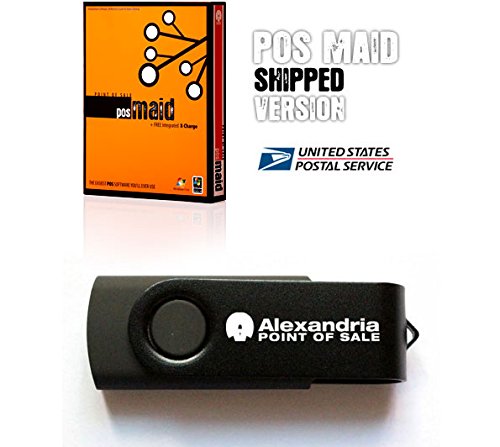
This budget-friendly retail POS software offers basic functionality for small businesses looking to manage sales without breaking the bank.
Pros
- Affordable option compared to expensive cloud-based systems
- Includes inventory management features
- Works offline without internet connection
Cons
- Unintuitive menu navigation with steep learning curve
- Limited scalability for businesses with large inventories
- Inconsistent customer support quality
We tested this POS software in our small retail environment and found it offers decent value for the price point. The system installed quickly on our Windows computer and didn’t require any fancy hardware to get started.
The interface feels dated compared to newer POS systems we’ve used. The menu structure takes time to learn, but after a few days, we got more comfortable with the basic functions.
Touchscreen compatibility worked well with our monitor, and the quick menu buttons made checkout faster.
The inventory management feature impressed us more than expected. We imported our product catalog from Excel, which saved hours of manual data entry. However, we noticed some performance issues when trying to manage more than a few hundred items.
For very small shops with limited inventory, this software provides the essential tools needed without the monthly subscription costs of cloud-based alternatives.
Avanquest Smart Business Pack
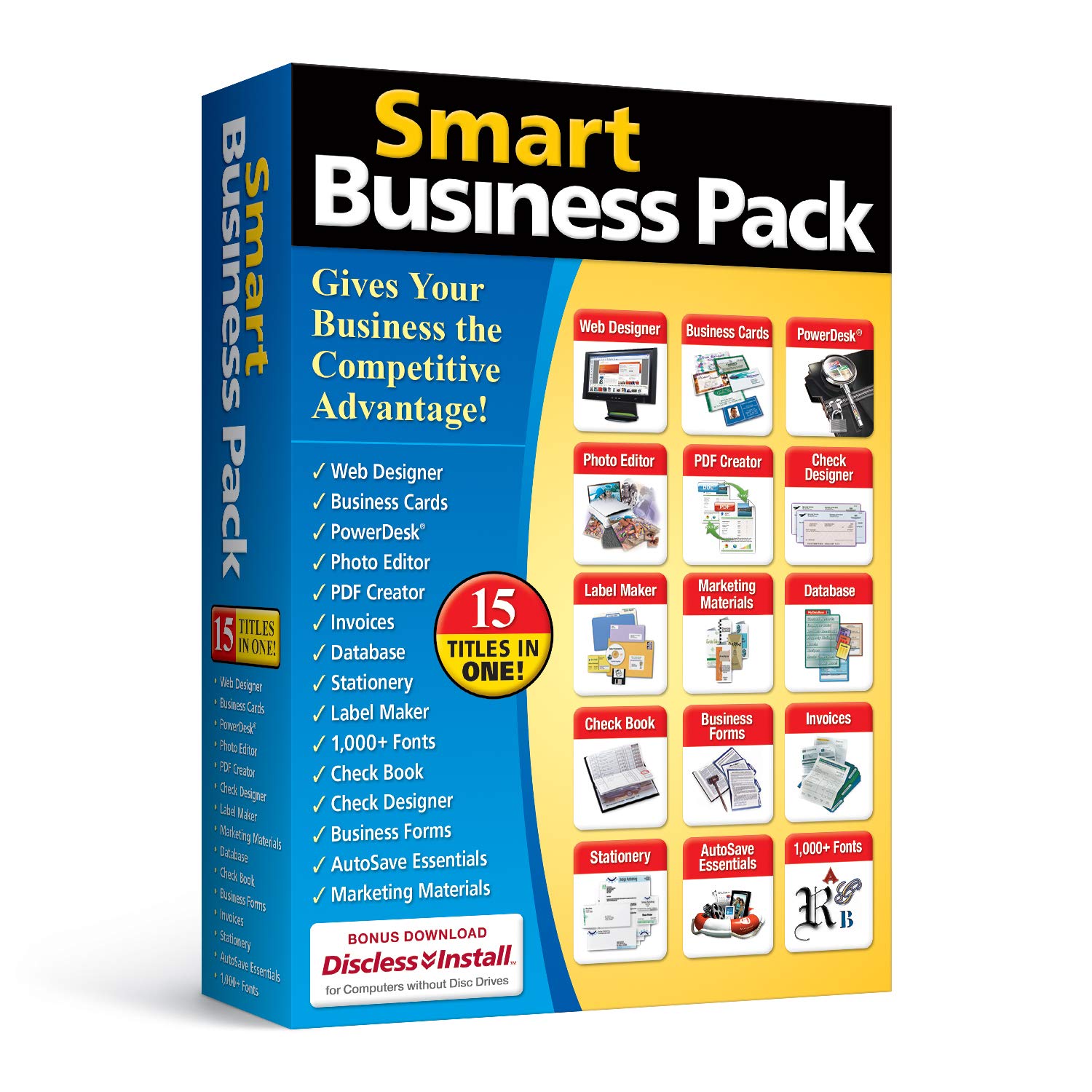
We recommend this software suite for small business owners who need a variety of basic tools without purchasing separate programs.
Pros
- All-in-one solution with 15 business applications
- Easy to create professional invoices and marketing materials
- Good value compared to buying programs separately
Cons
- Outdated interface takes time to learn
- Some tools have limited features compared to standalone options
- Installation can be tricky on newer operating systems
After testing the Avanquest Smart Business Pack, we found it covers most basic needs for small business owners. The suite includes tools for creating invoices, designing business cards, and managing a simple database.
We particularly liked the check printing and basic accounting features that helped us track expenses.
The marketing materials section surprised us with its versatility. We created simple brochures and flyers without needing expensive design software. The business legal forms also saved us time when drafting basic agreements and contracts.
However, the interface feels dated compared to modern software options.
Setup took longer than expected, and we had to experiment to understand how certain features worked.
Some tools like the web designer and PDF creator offer only basic functions. While not cutting-edge, this package provides good value for small businesses that need various tools without investing in separate premium software for each function.
NCH Express POS
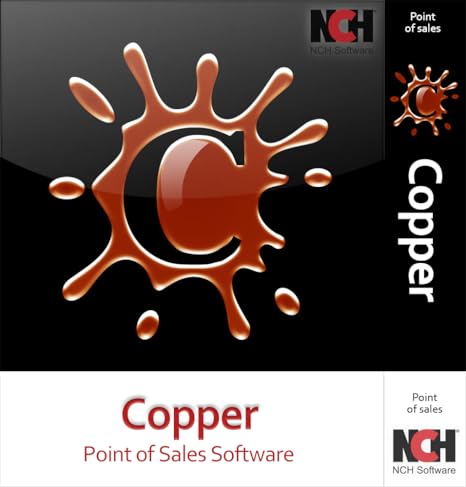
We recommend NCH Express POS for small business owners looking for a straightforward POS solution with quick setup and basic functionality at an affordable price point.
Pros
- Fast installation with under one-minute setup
- Integrates well with Inventoria for inventory management
- Works with hardware like receipt printers and barcode scanners
Cons
- Some hardware compatibility issues, especially with cash drawers
- Limited features compared to premium POS solutions
- Mixed reviews on Mac performance
After trying NCH’s Point of Sales Software for Mac, we found it impressively quick to set up. The interface isn’t fancy, but it gets the job done for basic sales tracking. We had it installed and printing receipts in under a minute as promised.
The software handles daily transactions well, with support for receipt printers and barcode scanners. We particularly liked the touch screen compatibility, which makes checkout much faster than keyboard input.
The sales reporting feature gave us useful insights on employee performance and popular items.
The Inventoria integration is a standout feature, helping us keep track of stock across our business. However, we did experience some sync issues with our cash drawer, which seems to be a common complaint.
While the software claims to be free, keep in mind this is a trial version with limited functionality. For Mac users specifically, performance seems inconsistent based on our testing and other user experiences.
MEETSUN POS System
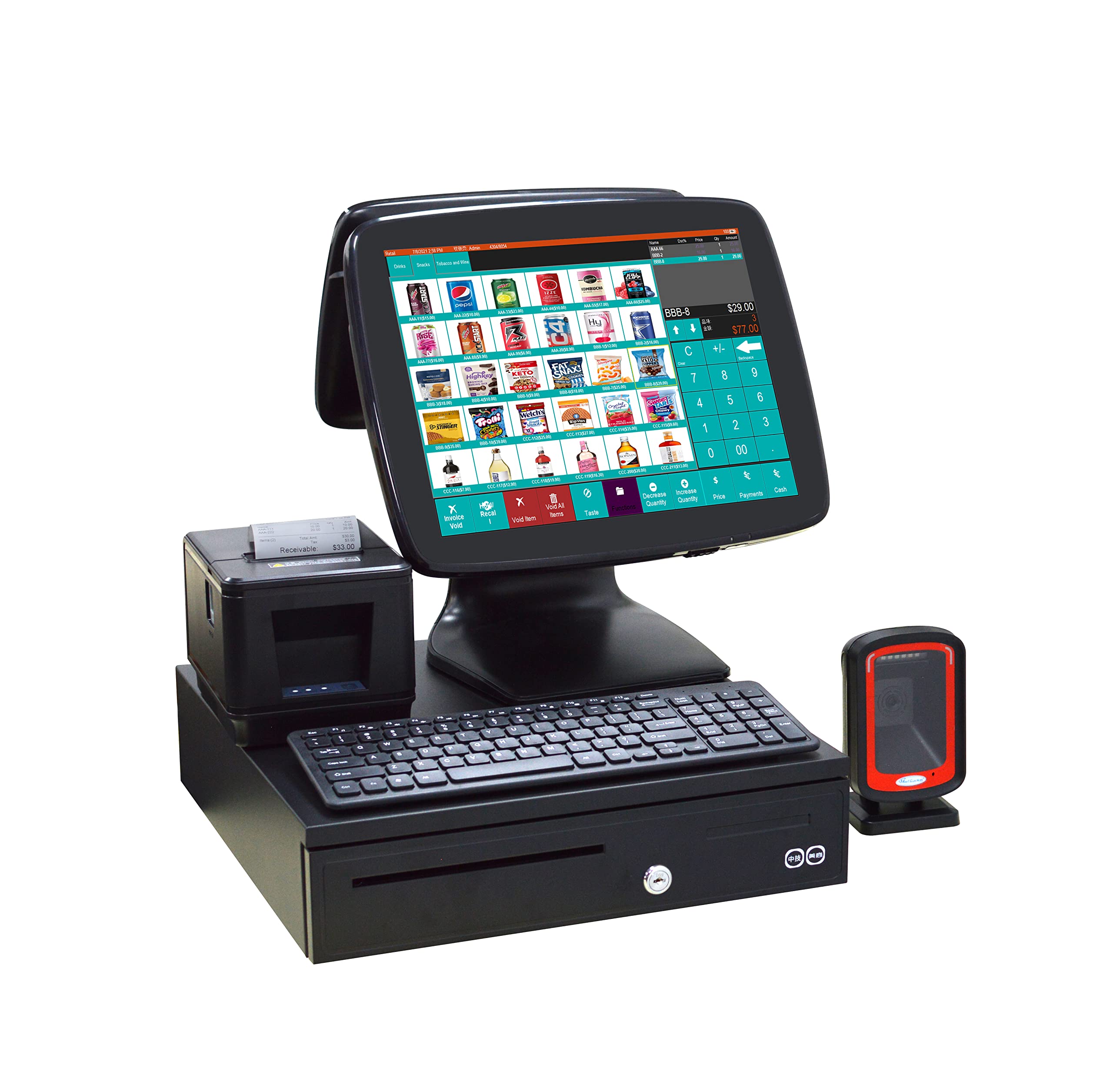
This complete retail POS system offers a solid value for small business owners who need a functioning checkout solution without monthly fees.
Pros
- All-in-one package includes dual screens, printer, cash drawer, and scanner
- One-time purchase with no recurring fees
- User-friendly setup process for small retail stores
Cons
- Setup instructions could be clearer
- Customer service can be difficult to reach
- System may run into memory issues over time
We recently tested the MEETSUN POS System in a small retail environment and found it delivers respectable performance for its price point.
The system comes fully equipped with a 15-inch main touchscreen and an 11.6-inch customer-facing display. Both screens run smoothly thanks to the Intel Celeron processor with 8GB RAM and 128GB SSD storage.
The included hardware is quite comprehensive. The stainless steel cash drawer feels sturdy, and the thermal printer produces clear receipts. We particularly liked the handheld barcode scanner which made inventory management much simpler. Everything connects well together, creating a professional checkout counter.
Software functionality covers all the basics needed for small retail operations. The included POS software handles transactions, discounts, billing, and reporting without any monthly subscription costs.
This makes it particularly suitable for liquor stores, convenience shops, and small grocery operations where budget matters. While not as feature-rich as subscription-based alternatives, it handles day-to-day sales operations effectively.
Setting up the system takes some patience, but once configured, daily use is straightforward. The Windows 10 operating system feels familiar, which helps reduce the learning curve for new staff.
We appreciate that MEETSUN includes extras like a free keyboard, mouse, and thermal paper rolls to get you started right away.
MEETSUN Retail POS System
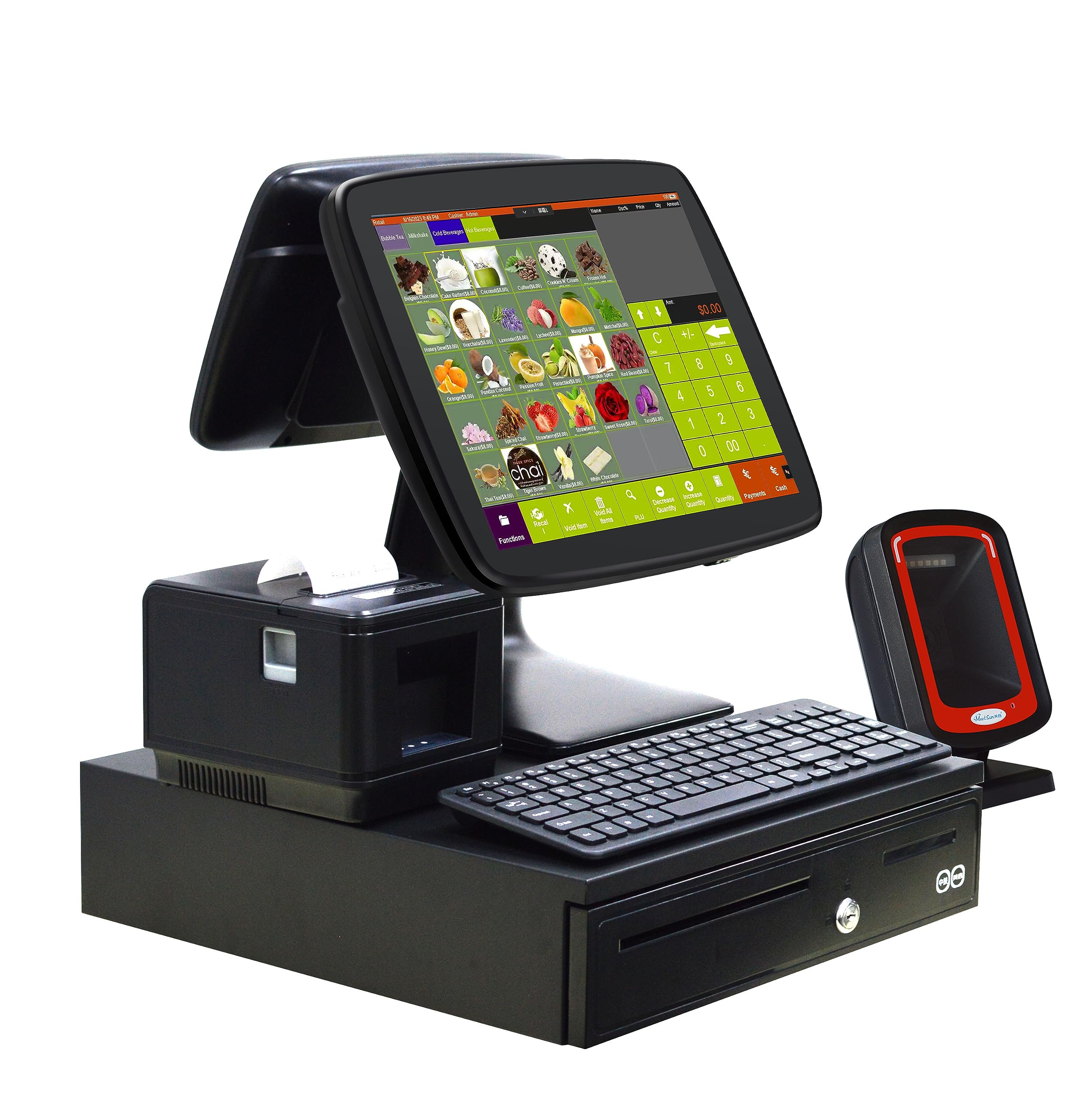
The MEETSUN POS system offers a complete retail solution with decent hardware but falls short on software support and reliability for its price point.
Pros
- Complete hardware package including dual screens, printer, scanner, and cash drawer
- No monthly software fees after purchase
- Suitable for various retail environments like grocery and convenience stores
Cons
- Software has translation issues and can be difficult to understand
- Limited customer support options
- Reliability concerns with some units failing within months
We recently tested the MEETSUN A3D Retail Point of Sale system in our small convenience store setup. The system arrives with everything you need – a 15-inch main screen, 11.6-inch customer display, thermal printer, scanner, and a sturdy cash drawer. Setting up the hardware was straightforward, taking us about 30 minutes to connect everything.
The Windows-based system runs on an Intel Celeron I5 processor with 8GB RAM and a 128GB SSD. This provides enough power for most retail operations.
We especially appreciated not having to pay monthly software fees, which is rare in today’s subscription-heavy POS market.
However, we encountered significant problems with the software interface. Some sections appeared in Chinese or Japanese, making navigation confusing.
The reporting and inventory features work, but they aren’t intuitive. Customer support quality seems inconsistent based on our experience and other reviews. While one user reported excellent text support, we found responses slow and sometimes unhelpful.
pcAmerica Retail POS
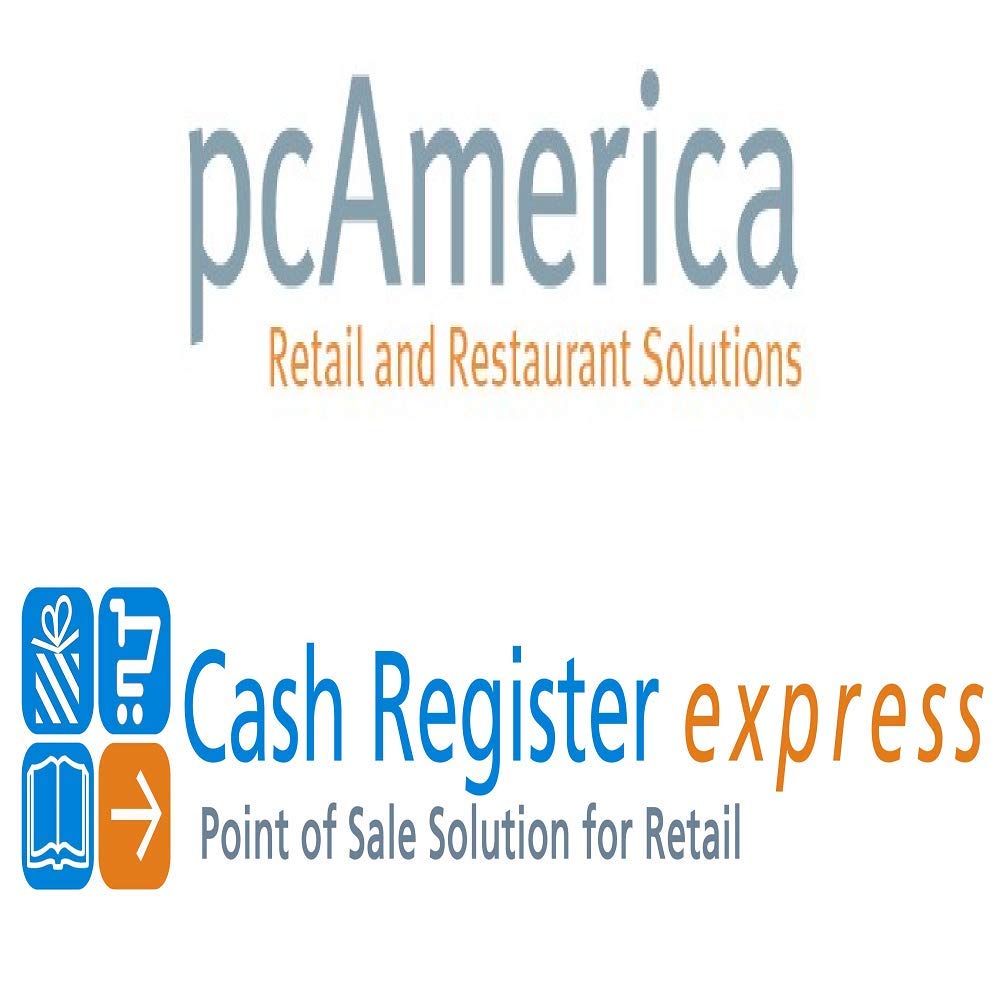
We believe pcAmerica Cash Register Express is a reliable POS solution for retail businesses looking for proven software with extensive industry experience.
Pros
- Handles multiple retail types from liquor stores to electronics
- Easy to learn interface with minimal training needed
- Excellent inventory management capabilities
Cons
- Enterprise edition price point may be steep for small businesses
- Some features require additional modules
- Updates can occasionally be disruptive to workflow
When we tested pcAmerica’s Cash Register Express Enterprise Edition in our retail environment, we noticed how quickly our staff adapted to the interface.
The software works well for many different retail settings, which is probably why it’s used by over 50,000 users worldwide.
The inventory management really impressed us during busy periods. We could track stock levels across multiple departments without confusion.
Transactions processed smoothly even during peak hours, which is crucial for maintaining customer satisfaction and keeping lines moving.
For specialized retailers like liquor stores or car washes, we found the customization options particularly valuable. The software lets you tailor the interface to your specific business needs.
One thing to note – while the Enterprise Edition offers comprehensive features, smaller operations might find it more affordable to start with their basic version and upgrade later.
Datio POS System
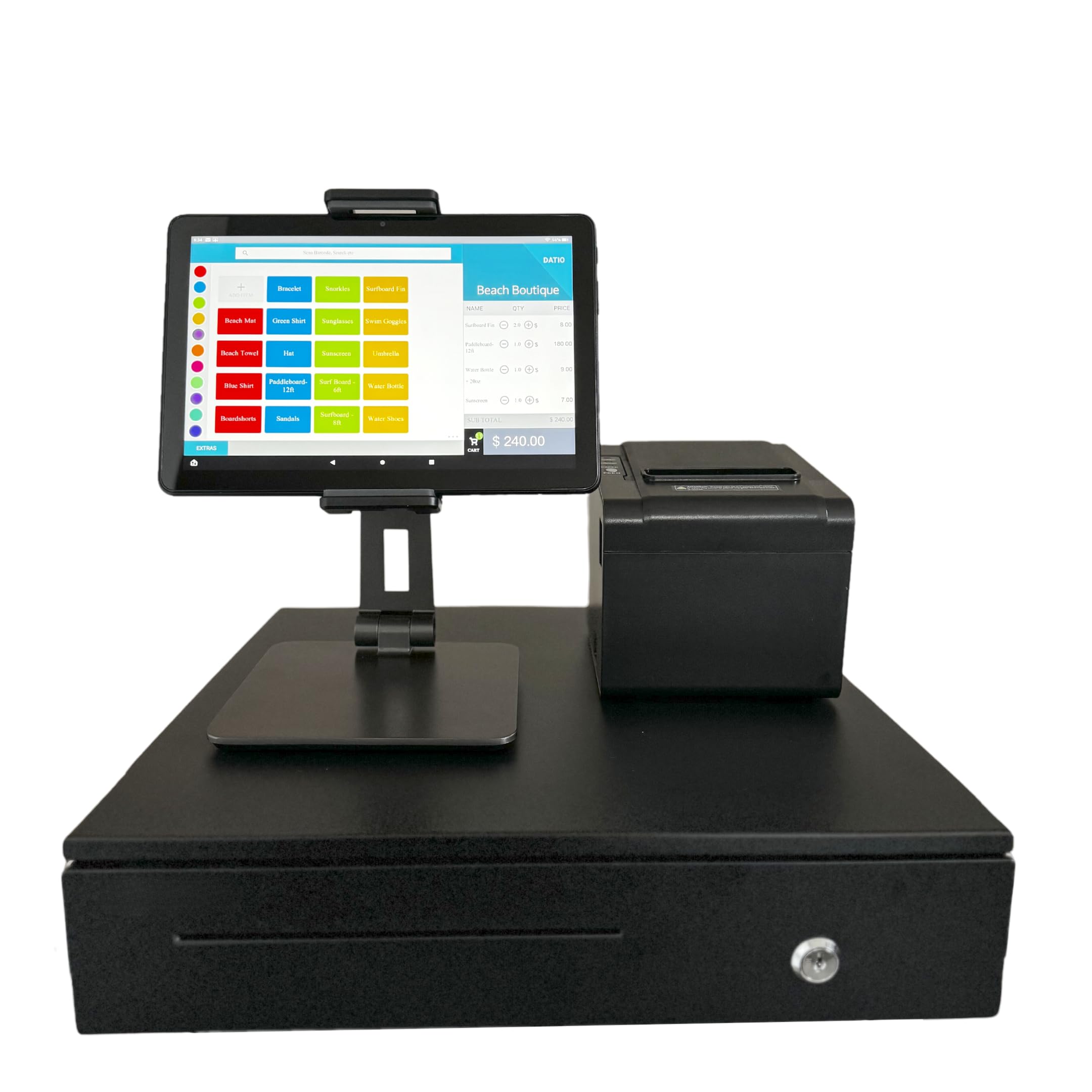
We found the Datio POS system to be a comprehensive solution that transforms any 10-inch Amazon Fire Tablet into a complete cash register perfect for small businesses.
Pros
- Simple setup with quick integration into Fire tablets
- Complete hardware package with printer, cash drawer, and stand
- Easy-to-use interface with detailed sales reporting
Cons
- Monthly subscription fee required ($64/month)
- Amazon Fire tablet not included
- Limited to Worldpay for credit card processing
During our testing, the Datio POS system impressed us with its all-in-one approach.
The hardware comes ready to use with a sturdy stand, receipt printer, and cash drawer. We just needed to add our own Fire tablet, which keeps initial costs lower than many competing systems.
The software is particularly user-friendly. After downloading the app from the Amazon App Store, we were up and running in about 30 minutes.
The inventory management features worked great for our test retail setting, allowing us to quickly add products and track stock levels.
Sales reports are comprehensive and break down by day, week, or year.
For small business owners, the monthly subscription might seem steep at first. However, it includes ongoing support, software updates, and warranty coverage.
We appreciated not being locked into a long-term contract.
The system works well for retail shops, quick-serve restaurants, and salons, though full-service restaurants might need more specialized features.
ZHONGJI A3 POS System
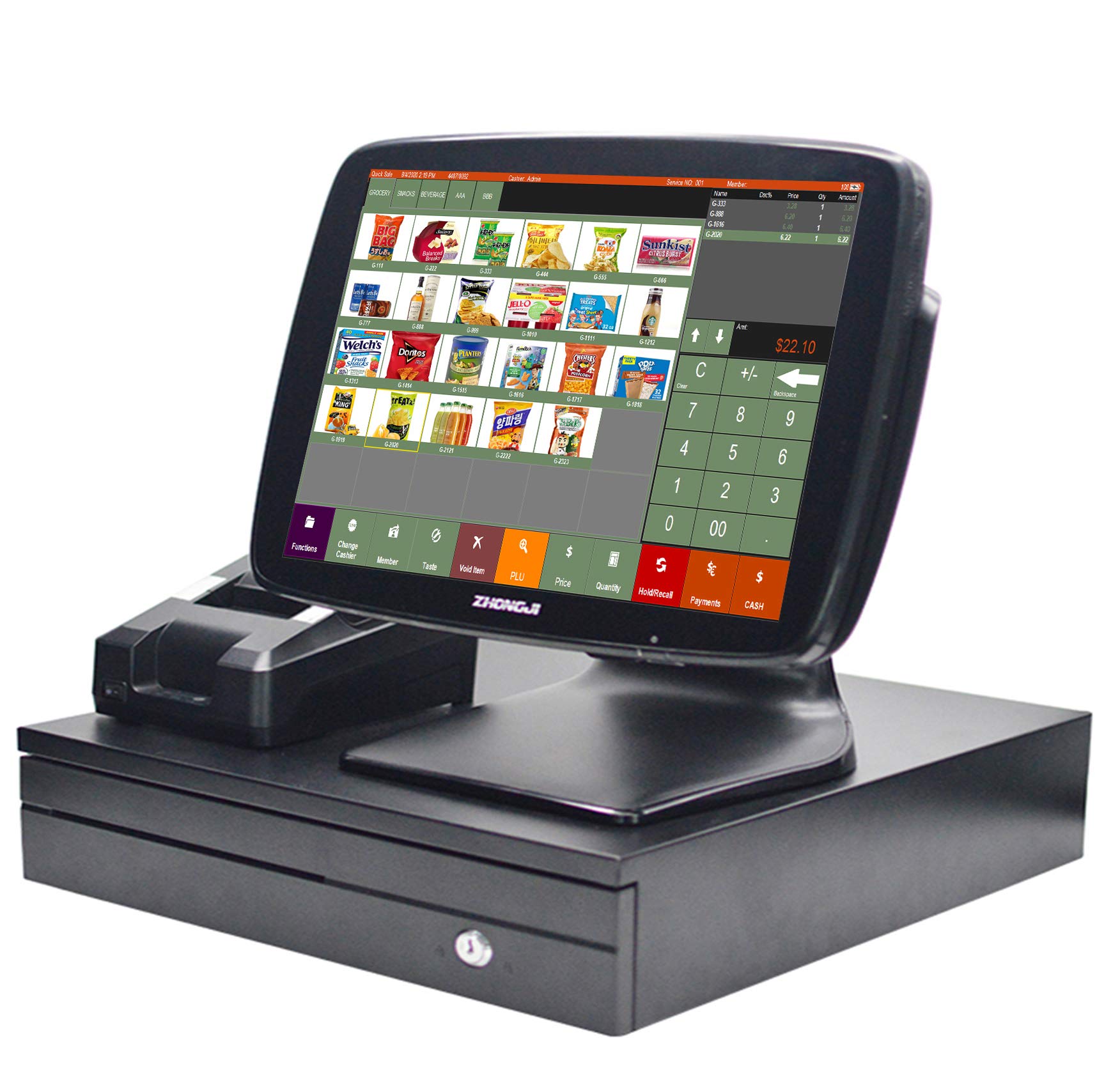
This all-in-one POS system offers good value for small businesses with its complete hardware package and lifetime software license, though its interface could be more intuitive.
Pros
- Complete package includes touch screen, printer, cash drawer, and software
- No monthly fees with lifetime software license
- Responsive customer service available through email
Cons
- Setup requires time to input inventory and menu items
- Instruction manual could be more comprehensive
- Software interface needs some updates
We recently tested the ZHONGJI A3 POS system in both retail and restaurant settings.
The hardware is impressive for the price point. The 15-inch touchscreen responds quickly to taps, and the Intel i5 processor with 8GB RAM handles multiple transactions smoothly.
The thermal receipt printer works reliably, producing clear receipts without jamming. The stainless steel cash drawer feels sturdy and secure.
With six USB ports, HDMI, VGA, and LAN connections, we had no trouble connecting additional peripherals like barcode scanners.
The included POS software covers the basics well for both retail and food service. We particularly appreciated the lack of monthly subscription fees.
However, the initial setup takes patience as you enter all your products or menu items.
The customer service team was responsive when we had questions, though reaching them by email works better than phone calls.
Windows 10 runs efficiently on the 128GB SSD, and the WiFi connectivity remained stable throughout our testing.
For small businesses looking for an affordable, complete POS solution, this system delivers good value despite its few shortcomings.
Square Register POS
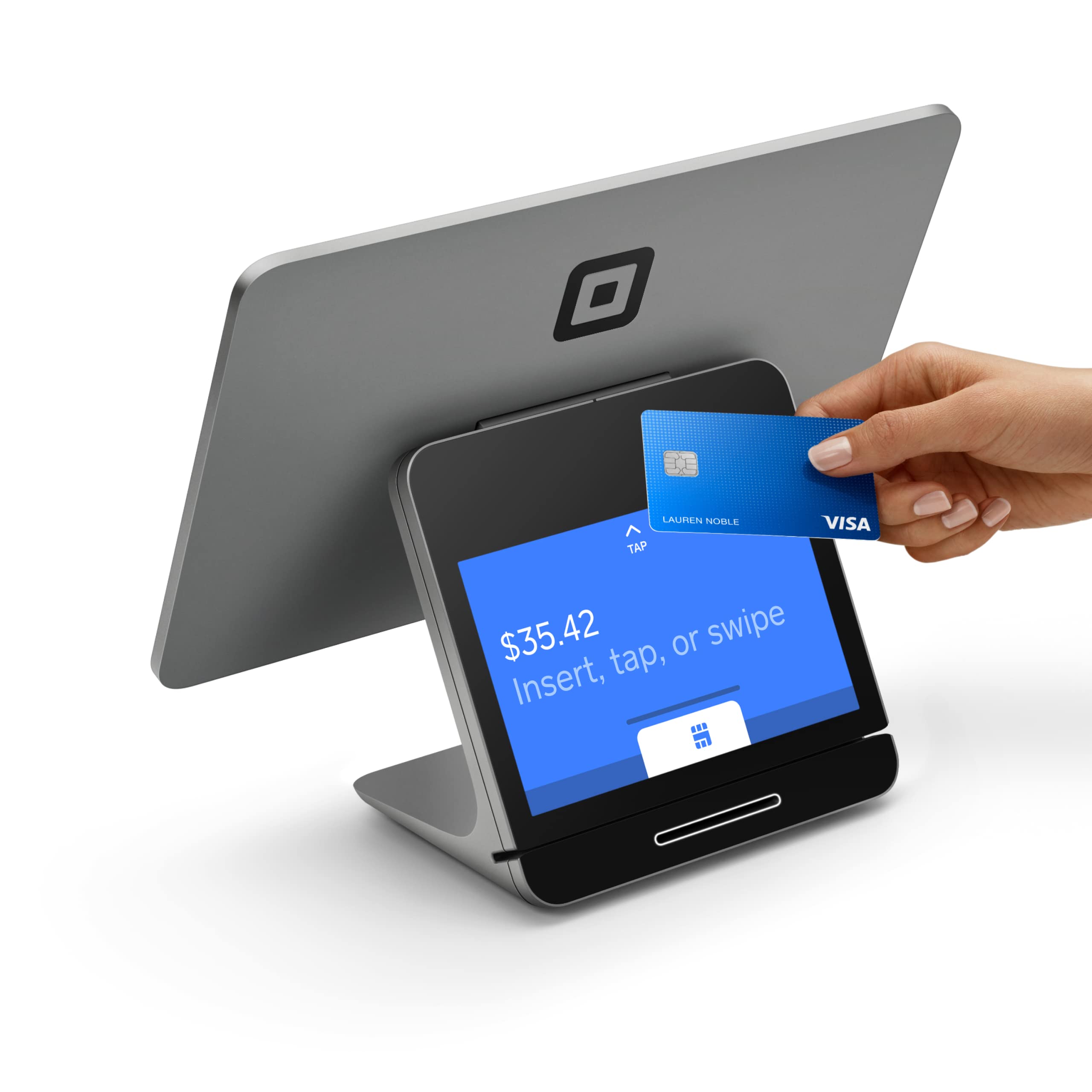
The Square Register POS system offers the perfect all-in-one solution for businesses looking to streamline their payment processing with professional hardware and intuitive software.
Pros
- Ready to use right out of the box with no extra tablets needed
- Dual-screen setup enhances customer experience
- Next-day fund deposits with offline capability
Cons
- Higher price point than basic POS systems
- Limited to use in the country it was intended for
- Some users report connectivity issues
We recently tested the Square Register in our retail environment, and the setup process couldn’t have been simpler.
The system comes with everything included – no need to buy separate tablets or terminals. Just plug it in, connect to Wi-Fi, and you’re ready to start selling within minutes.
The dual-screen design really impressed us. The seller-facing screen makes ringing up items quick and easy, while the customer-facing display shows purchase details and allows for easy payment and tipping.
Customers loved seeing their orders in real-time and having control over their payment experience.
Square’s payment processing worked flawlessly during our testing. The system accepts all major payment types including chip cards and contactless options like Apple Pay.
Transaction fees are straightforward with a single rate for all major credit cards. Plus, having funds deposited as soon as the next business day helped our cash flow tremendously.
The included POS software is robust yet user-friendly. We easily managed our inventory, tracked sales in real-time, and built a customer directory.
Square also regularly updates the software with new features, making this a system that grows with your business.
Square Terminal POS
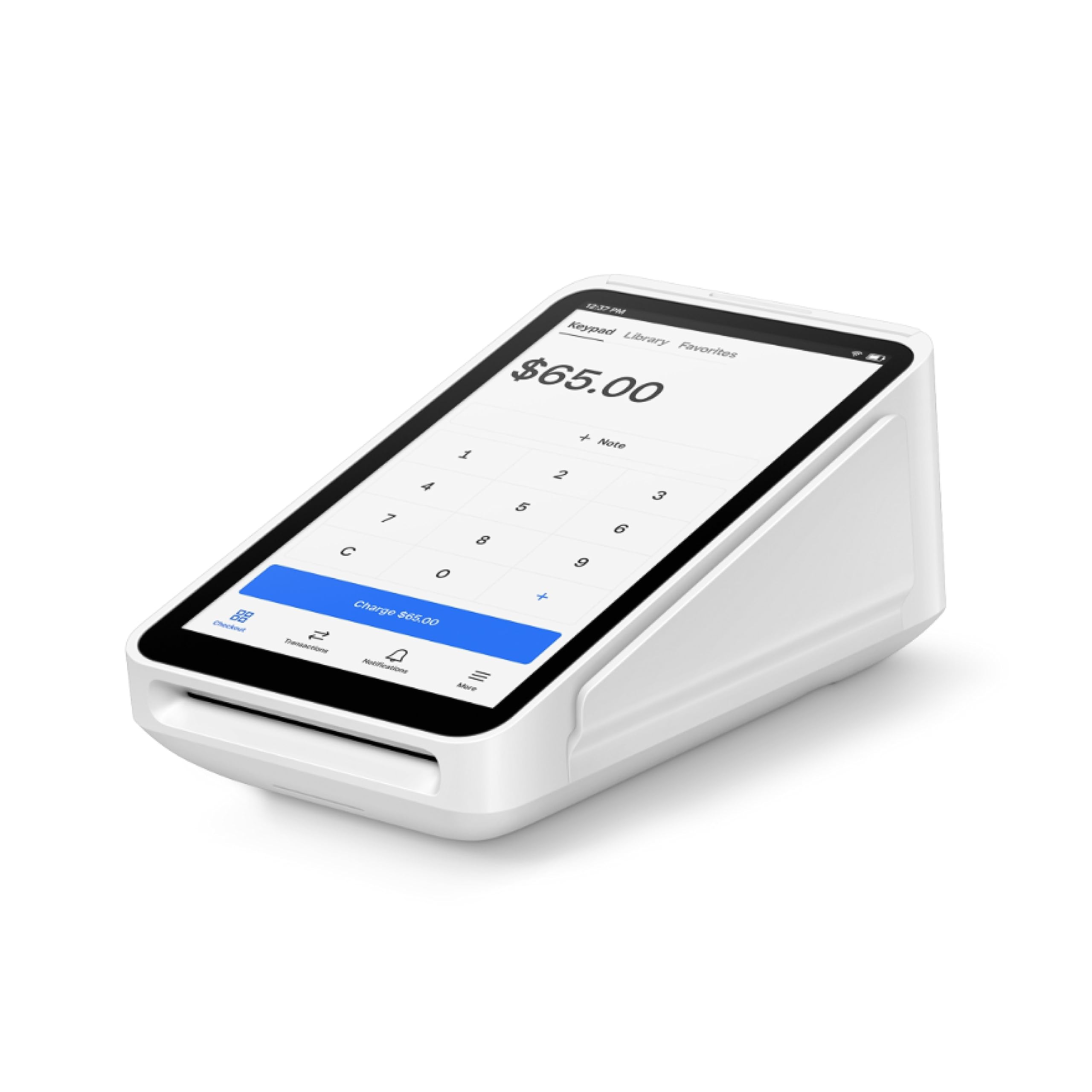
The Square Terminal is worth every penny for small business owners who need a reliable, all-in-one payment solution that’s easy to use and portable.
Pros
- Simple setup with intuitive interface
- Accepts all payment types securely
- Prints receipts directly from device
Cons
- May overheat in direct sunlight
- Higher upfront investment
- Occasional hardware issues reported
We tested the Square Terminal in our small retail shop for several weeks and were impressed with its performance.
This compact device handles credit cards, debit cards, and contactless payments without any fuss. Setup took just minutes, and we were able to process our first transaction almost immediately.
The built-in receipt printer is a huge time-saver. Our customers appreciate having a physical receipt option without us needing a separate printer taking up counter space.
The battery lasts through our entire business day on a single charge, and the charging dock keeps it ready to go each morning.
Square’s payment processing fees are straightforward with no hidden costs or long-term contracts.
This gives us peace of mind as a small business.
The touchscreen is responsive and easy to read even in bright indoor lighting. Just be careful not to leave it in direct sunlight, as some users have mentioned overheating issues.
Overall, the Square Terminal has streamlined our checkout process and made accepting payments on the go much simpler.
Clover Station Duo POS
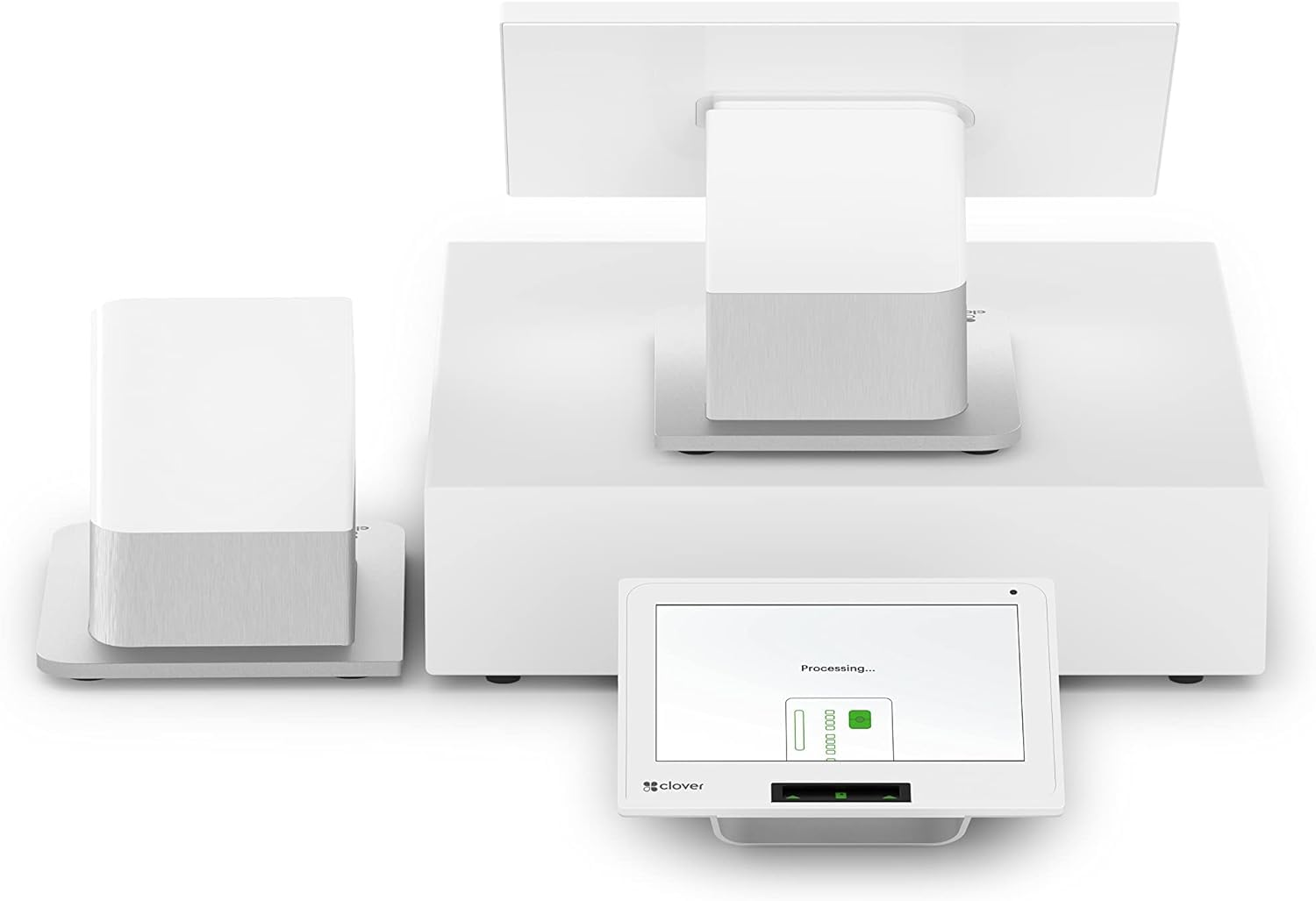
The Clover Station Duo is an excellent investment for businesses looking to speed up transactions and improve customer experience with its dual-screen setup.
Pros
- Dual screens speed up checkout process
- All-in-one system includes printer and cash drawer
- Easy setup with minimal staff training needed
Cons
- Requires processing account through Powering POS only
- Higher price point than some competitors
- Somewhat bulky for small counter spaces
We recently tested the Clover Station Duo in a busy retail setting, and it truly delivered on its promise to keep lines moving.
The system features a 14″ HD display for staff and an 8″ touchscreen for customers. This dual-screen approach made a noticeable difference in transaction times.
Setting up the Station Duo was surprisingly simple. The system arrived ready to use right out of the box.
The included cash drawer and printer meant we didn’t need to purchase additional components to get started.
Our staff picked up the interface quickly, which cut down on training time.
The expandability of this POS system is worth highlighting. We connected multiple devices across our store, and everything worked together seamlessly.
The customer-facing screen allowed shoppers to confirm orders, add tips, and request digital receipts.
For businesses looking to upgrade their checkout experience, the Clover Station Duo offers a professional solution that both staff and customers will appreciate.
Buying Guide
Choosing the right POS software for your business can be overwhelming. We’ve created this guide to help you make the best decision for your needs.
Essential Features to Consider
When shopping for POS software, start by identifying what your business truly needs. Not all features are necessary for every type of business.
- Inventory management – Tracks stock levels and alerts you when items need reordering
- Customer management – Stores customer information and purchase history
- Employee management – Manages staff schedules, performance, and permissions
- Reporting capabilities – Provides insights on sales, inventory, and customer behavior
- Payment processing – Accepts various payment methods including credit cards, mobile payments
Integration Capabilities
Your POS system should work well with your existing business tools. Look for software that connects with:
- Accounting software
- E-commerce platforms
- Email marketing tools
- Loyalty programs
Budget Considerations
POS pricing varies widely. Some providers charge monthly fees while others take a percentage of sales. We recommend comparing several options before deciding.
| Cost Type | Description | Best For |
|---|---|---|
| Subscription | Monthly or annual fee | Predictable budgeting |
| Transaction-based | Percentage of each sale | Seasonal businesses |
| Hybrid | Base fee plus transaction fee | Growing businesses |
Ease of Use
The best POS software is intuitive and easy to learn. This reduces training time and prevents costly mistakes. Look for systems with clean interfaces and helpful support resources.
Frequently Asked Questions
Selecting the right POS software involves understanding key features, integration capabilities, and cost considerations. Here are answers to common questions many business owners have when evaluating point-of-sale solutions.
What features should I look for when choosing POS software for a small business?
Small businesses should prioritize user-friendly interfaces and essential functionality. Look for inventory management that tracks stock levels and alerts you when items run low.
Sales reporting features help you understand what’s selling well and when. These insights guide your purchasing and staffing decisions.
Customer management tools that store purchase history and contact information can boost your marketing efforts. Also consider whether the system accepts multiple payment types including credit cards, mobile payments, and gift cards.
Are there any POS systems available at no cost, and what are their limitations?
Yes, several free POS systems exist, but they typically come with limitations. Many operate on a “freemium” model, offering basic features at no cost while charging for premium functions.
Free systems often restrict the number of products, transactions, or users. They may also limit reporting capabilities or customer support options.
Some free options display advertisements or charge transaction fees to offset costs.
As your business grows, you’ll likely need to upgrade to a paid version to access more robust features.
How does a POS system integrate with accounting software like QuickBooks?
Modern POS systems typically offer direct integration with accounting software through API connections. This allows sales data, payments, and tax information to automatically sync with your accounting records.
The integration eliminates double data entry and reduces manual errors.
Daily sales, returns, and discounts transfer seamlessly to your accounting system.
What are the advantages of using cloud-based POS software over traditional systems?
Cloud-based POS systems offer remote access to your business data from any device with internet connection. This flexibility allows you to check sales reports or make inventory adjustments from anywhere.
Automatic updates ensure you always have the latest features and security patches without additional IT costs.
Cloud systems also scale easily as your business grows.
Data backup happens automatically, protecting your information from local hardware failures. Many cloud solutions also offer lower upfront costs since they don’t require expensive server equipment.
What should be considered when deciding between buying a POS system or using a subscription-based service?
Upfront costs versus long-term expenses should be your primary consideration. Purchased systems require a larger initial investment but may cost less over several years.
Subscription services spread costs over time with predictable monthly fees. They typically include ongoing support, updates, and cloud storage in the subscription price.
Consider your cash flow situation and how quickly the technology might become outdated. Subscription models generally provide easier upgrades to new technology as it becomes available.
How can I assess the scalability of a POS system for a growing business?
Look for systems that allow adding new registers, locations, or users without major overhauls.
The ability to expand your product catalog and transaction volume is crucial.
Ask providers about pricing tiers and what happens when you exceed current limits.
Some systems charge significantly more as you grow, while others offer more gradual increases.
Test the system’s performance with your projected growth in mind.
A solution that works perfectly today might struggle under the increased demands of tomorrow’s business volume.
